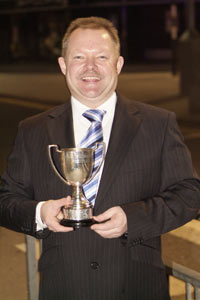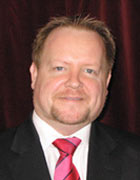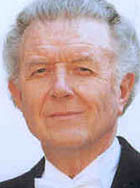2007 North West Regional Championship - Championship Section retrospective
16-Mar-2007The usual suspects had a bit of a surprise or two here on the weekend, but it couldn't stop Fodens Richardson picking up their 14th regional title.
You often see analogies between sport and banding on 4BR. The reason for this is quite obvious, as contesting itself is a type of sport (unfortunately for many of us it doesn't quite have the same physical benefit of most types!).
 Quite frequently the sport (when it's not a certain red shirted rugby team!) where most links are made is football and in particular the English Premiership. In terms of the balance of power at the top echelon of the Championship Section and the top clubs in the Premiership the analogy is clear to see.
Quite frequently the sport (when it's not a certain red shirted rugby team!) where most links are made is football and in particular the English Premiership. In terms of the balance of power at the top echelon of the Championship Section and the top clubs in the Premiership the analogy is clear to see.
It's a pretty safe bet that, year in year out, the top four positions in the league are going to be occupied by the usual suspects: Arsenal, Chelsea, Liverpool and Manchester United (note, alphabetical order for arguments sake!). Occasionally one over- achieving ‘David' may sneak into that top four at the expense of one of the ‘Goliaths', but it can be safely assumed that one of the big boys will carry away the major silverware. So it is in many of our leading Championship Contests and none more so, over the last few years at least, than at the North West Area in Blackpool. Well, there was no earth shattering acts of giant killing here this year either, but a little bit of the status quo was ended, leaving one of bandings big names to lick its wounds.
As contests go, this seemed to be a pretty clear cut one for both the official adjudicator, James Scott, and all the unofficial ones seated in the Empress Ballroom in Blackpool's Winter Garden Complex: two bands, giving performances that on this form will put them amongst the favourites at the Royal Albert Hall in October, clear at the top, another three delivering performances that may well have earned them qualification in other areas, and then the rest left to fight out the rest of the places. Some may have quibbled over the exact order that Mr Scott placed the bands, but overall, in this listener's opinion, he'd got it pretty much right.
Of course, this year, unlike many previous, due to Yorkshire's almost total domination of the top four places at the Royal Albert Hall last October, the North West will only send two of its finest to this year's finals. So, a straight fight between Fairey, Fodens and Leyland, right? Well, nearly, but not quite as only two of the bookies' favourites fulfilled many pundits' pre match predictions. Those who regularly attend and listen to more than just the ‘big boys' at this particular contest will have chartered the gradual progress and rise of at least two of their ‘rivals'. And so it was that the monopoly of the last few years was finally broken, all be it only slightly.
This year, the Top Section bands and adjudicator found their assignments to be just that little bit tougher due to the relocation of the contest to the Empress Ballroom.
This was down to Michael Flatley and his troupe of dancers, strutting their stuff in Lord of the Dance in the section's normal home, the Opera House. As has been well documented, the Ballroom is a fine venue for many events and has aged well, visually, over the years. However, as the setting for a brass band contest of this level, requiring our elite to play virtuosi works at break neck (written) speeds it is far from ideal. At this point it has to be said that, yes, I know that it was the same for all bands, a level playing field. But when bands are playing the more rapid sections, at the given tempos, and we still can't hear any detail, how does the adjudicator separate the good from the average and the average from the bad. The word lottery may not be far from the cynic's tongue.
Happily, this wasn't the outcome last Sunday as there was enough in Robert Redhead's demanding ‘Isaiah 40' to pretty much sort the wheat from the chaff.
Playing off a fairly early number five draw, Fodens Richardson took first prize and with it an invite to South Kensington in the autumn. They set a standard that previous bands had failed to reach and those following couldn't quite match.
This was an excellent performance, showing a very high level of consistency of solo and ensemble playing. Garry Cutt did what he does best, and perhaps others should follow more often, and interpreted the score as it was written. Helen Tyler's opening baritone soliloquy gave the band a fine start and the subsequent allegro section was suitably boisterous. Mark Wilkinson on cornet and Glynn Williams on euphonium gave perhaps the most secure and expressive solo playing of the day.
Sure, there were slight clips and slips here and there, as there seem to have been in virtually all of the readings of this demanding work across the country, but by the time they reached the majestic closing section, said by the composer to represent the soaring eagle, they were clearly leading the field and their name remained on the vast majority of lips through to the end of the day. On this sort of form, Fodens should be there or thereabouts throughout the year. Next up, the Europeans……
Not far behind came a highly musical reading from Russell Gray and his resurgent Leyland Band. Russell has quickly carved a reputation as one of the most sought after conductors of the moment and it's easy to hear why. His performances always have the hallmark of thorough preparation, but also some originality in the interpretation of the score.  As one would expect, Katrina Marzella gave what was perhaps the most convincing start to the work of the day and Lesley Howie, undoubtedly delivered the finest horn solo. Risks were taken with the faster tempos, especially the Caribbeanesque section, but it was never less than exciting.
As one would expect, Katrina Marzella gave what was perhaps the most convincing start to the work of the day and Lesley Howie, undoubtedly delivered the finest horn solo. Risks were taken with the faster tempos, especially the Caribbeanesque section, but it was never less than exciting.
Again, there were slips, especially a corker of a split at the cadence of one of the cornet fanfare figures, and it perhaps lacked the accuracy and fluency of Fodens at times, but the closing sections drew some fantastic sounds from the band and deservedly earned the band a chance to regain the Nationals Trophy they won in 2005.
Third place was the reward for Wingates fine marker performance off the dreaded Number 1 draw. Here was a band that has been quietly rebuilding over a fair amount of time, giving notice that they really can mix it with the best again.  They have an interesting blend of experience, led by the excellent Andy Macdonald (arguably the finest sounding cornet player of the day, despite an unfortunate sticky valve) and youthful exuberance of 11 year-old (!) Solo Trombonist, Peter Moore. Add to that the cool head and sensible direction of the band's conductor, the Trombone virtuoso, Andy Berryman, and you've got a band to look out for over in the coming months.
They have an interesting blend of experience, led by the excellent Andy Macdonald (arguably the finest sounding cornet player of the day, despite an unfortunate sticky valve) and youthful exuberance of 11 year-old (!) Solo Trombonist, Peter Moore. Add to that the cool head and sensible direction of the band's conductor, the Trombone virtuoso, Andy Berryman, and you've got a band to look out for over in the coming months.
In his summing up prior to the results, James Scott told how he thought that, in his view, very few bands had captured the misterioso of the opening. Well, Wingates, and their baritone section certainly did and what a great start to the contest it made. The rest of their performance maintained the high standard of the opening, give or take a few slips in solo lines, an occasional untidiness of ensemble and the impression that they just ran out of a bit of steam towards the end.
We had them 5th, but there was little to choose between the bands placed 3rd-5th and nobody could really argue that they didn't deserve the placing given to them by Mr Scott after such an impressive effort from a testing draw.
BT's fourth place (we had them 3rd) may have come as a surprise to some, but not to anyone who had stopped in the hall to listen to the performance of the Stockport based band that Mike Fowles has been steadily developing over the last few years.  A consistent and solid performance featured secure soloists and some finely balanced ensemble playing. This was enhanced by a sensible, stylish and well paced reading from the MD. The big tune at the end was clearly brought out (a problem in other performances) and they closed the work in resounding fashion.
A consistent and solid performance featured secure soloists and some finely balanced ensemble playing. This was enhanced by a sensible, stylish and well paced reading from the MD. The big tune at the end was clearly brought out (a problem in other performances) and they closed the work in resounding fashion.
It might just have lacked the finesse of the top two bands, but the overall show is one the band should be proud of and, coupled with their recent victory at Preston, here is another band to listen out for this year.
The biggest upset of the day was perhaps the 5th place awarded to Fairey Band. They can have little room to grumble, however. It wasn't that Faireys played badly, in fact their playing, and the interpretation of the evergreen Major Peter Parkes, in the slower and more expressive sections of ‘Isaiah 40' was some of the best of the day. It was just that other parts of their performance weren't up to the level of the bands placed above them.
 This wasn't vintage Faireys, but that's hardly surprising giving their seemingly turbulent last few months. There were plenty of new faces on stage and they, and any subsequent changes, will take time to gel. Special mention must be made of newly appointed Principal Cornet, Mike Eccles, who gave a fine account of himself and led the band with aplomb.
This wasn't vintage Faireys, but that's hardly surprising giving their seemingly turbulent last few months. There were plenty of new faces on stage and they, and any subsequent changes, will take time to gel. Special mention must be made of newly appointed Principal Cornet, Mike Eccles, who gave a fine account of himself and led the band with aplomb.
The number 2 draw possibly didn't help Faireys (although it didn't seem to affect Wingates), but a more obvious problem seemed to be the breakneck speed that the more rapid sections were taken at. This was particularly obvious during the opening Presto and during the succession of gradual accelerandi towards the end of the work.
In the barn like acoustic of the ballroom a lot of the detail was lost. The writing was perhaps on the wall in a slightly anticlimactic ending to the work (the big tune got a bit lost and the last note was almost over before it began!). This wasn't a poor performance-we had them 4th- and Faireys will be back. They have enough good players and strong personalities to ensure that.
Outside of the top 5 performances the standard fell away slightly, but as was confirmed by the adjudicator there were no poor showings last Sunday and the North West can be justifiably proud of the general level of its top section.
6th prize was awarded to a delighted United Co-op Milnrow, conducted by Andrew White. Their delight at the announcement of the result was understandable as, following last year's 10th position, this placing ensured that they would keep their position in the championship section. Drawn third, this was a gutsy performance with decent soloists and a good reading, showing fine control of changes of tempi, particularly in the accelerando sections at the end.
It has to be said that we did have them lower down in 10th position as despite the sterling effort around the stand, we thought the split count and occasional poor intonation may tell in the overall reckoning. However, there seemed to be little to choose between the bands in the mid to lower half of the results so who are we to argue. This was just our opinion; the important one was, of course, Mr Scott's.
Pemberton Old Wigan JJB, directed by Mark Peacock, is a band that has been very consistent here over the last few years and this run was continued with another mid table finish. 7th place was spot on for us. This was a good performance, obviously thoroughly prepared. Soloists played well overall, but the occasional accidents that could be heard in individual lines (perhaps down to nerves) and a couple of messy moments in the Caribbean section probably cost them a higher placing.
Blackburn and Darwen, led by Nick Sheppard was the last band to play in this section and ended up in 8th position. We had them in 9th. This was another fairly strong performance with generally good full ensemble playing and solid soloists. Just occasionally the sound became a little forced and the cornet fanfare section did appear a little rushed, consequently seeming somewhat of a struggle. There were clips and blips around the stand and some problems in intonation, but overall this was a fairly convincing full band showing.
This was very much the case for Freckleton, who will perhaps be a little disappointed with 9th position (we had them 8th), but shouldn't be too disappointed with the performance. Drawn four, Musical Director, Paul Dalton, drew some exciting sounds from his band. The shine was somewhat taken off, however, by a sprinkling of splits and moments of questionable intonation.
A feature of this performance was the strong sounding cornet section, led, in exemplary fashion, by former British Open Solo Champion, Alex Thomas, whose solo playing was of an equally high standard. The euphonium solo followed suit, but was somewhat obscured by some rather overbearing cornet triplets. Balance was also an issue towards the climax of the piece as we struggled to hear the big melody. Nevertheless, this was a very good effort.
Newly promoted and very much a band on the up, Bactiguard Wire Brass and Musical Director, Paul Andrews, will undoubtedly be disappointed with their 10th position. This was a powerful and confident showing (especially from the MD!) from the number seven draw that seemed to have a bit more about it than the rest of the performances outside of the top five.
Everything was there, without sounding 100% comfortable all of the time. Andrews' interpretation drew some impressive musical shapes (particularly towards the end of the piece) from his band, enhanced by some fine dynamic contrast. However, there were moments of untidiness (a massive trombone split in the opening Presto section) and scrappiness in the ensemble and at times it was rather frenetic. It certainly grabbed your attention though, but perhaps was a bit too ‘in your face' for James Scott's tastes. We had them 6th.
Playing directly after Leyland was never going to be easy for Vernon Building Society Poynton and so it proved to be. 11th and last position was Mr Scott's decision and we couldn't really argue with this. From the very opening the nerves seemed to set in and the band and MD, Alan Lawton MBE (who never took his eye off the ball) seemed to spend the opening few minutes combating the effects of this.
Full credit to them though, as, from about five minutes in, the performance level picked up markedly, led by some fine solo cornet playing. Sure, there was still the odd splash here and there and the euphonium solo seemed to go a little astray towards the end, but overall it was if they acclimatised to their surroundings. Too late some may say, but it could easily have gone the other way.
So that was that then. As in Yorkshire, ‘Isaiah 40' proved to be a real test for the bands in Blackpool. Nobody came through unscathed and it certainly seemed to make James Scott's decision a little easier when it came to the crunch.
Peter Bates and his organisational team are to be congratulated for the seamless way everything ran (the Championship Section was done for 7.30pm, although the Second Section was still going). On the face of it, it seems as if it was business as usual in Blackpool, as two of the usual suspects could once again book their hotels in London for October. On this sort of form, both bands will feel they have a real chance of claiming glory.
However, this was only half the story as this year's contest may well be remembered for the performances of Wingates and BT who finally broke up the monopoly of the big 3. They (and Faireys) will hope that their region's representatives can do the business at the Albert Hall so that next year the North West can send more of its finest on the journey south.
Mark Bousie















